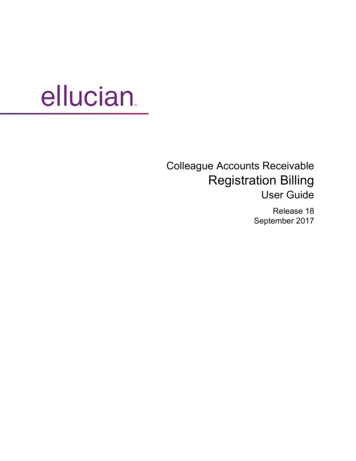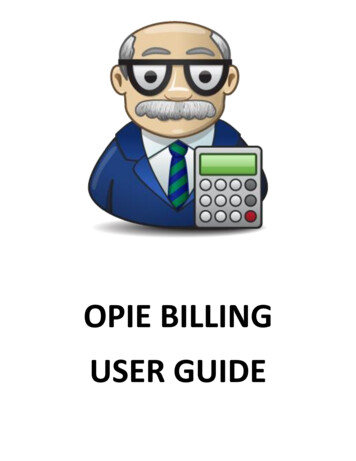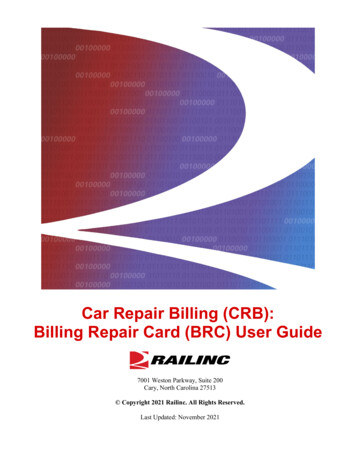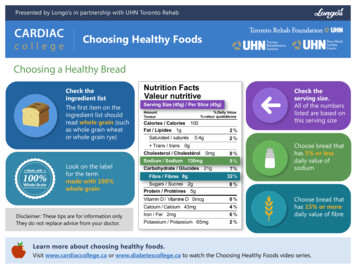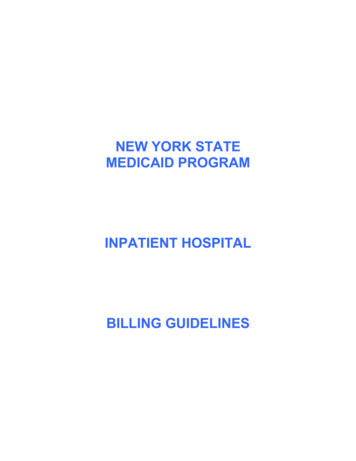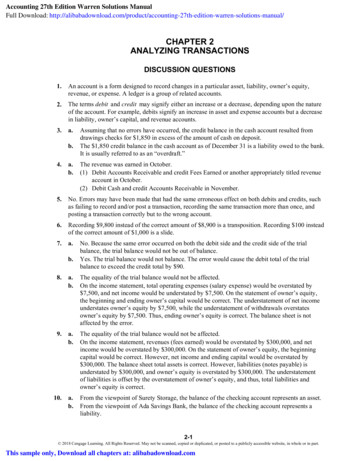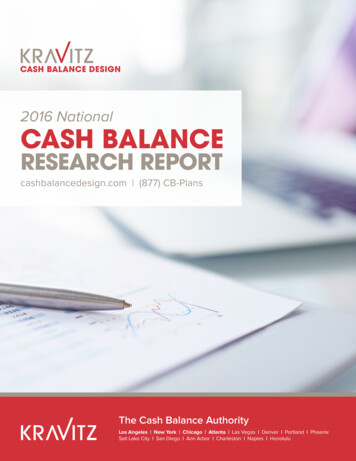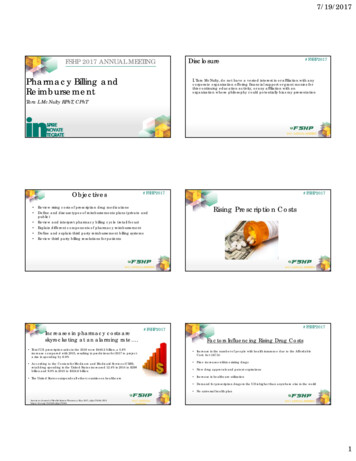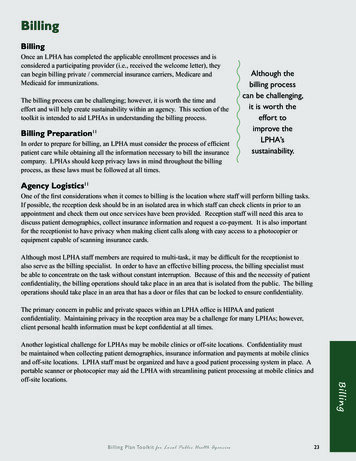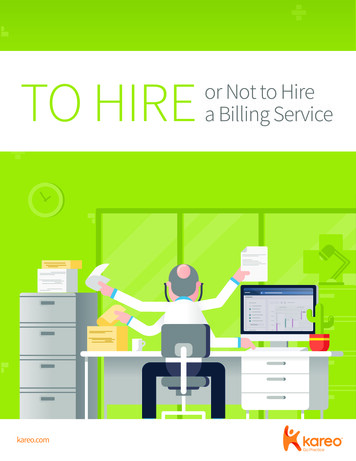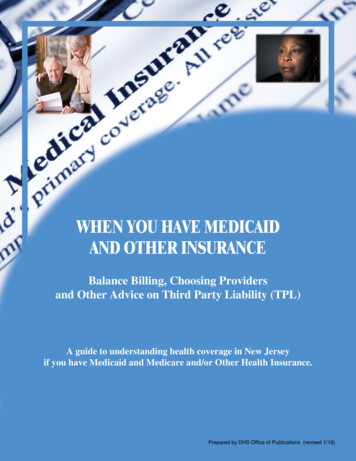
Transcription
WHEN YOU HAVE MEDICAIDAND OTHER INSURANCEBalance Billing, Choosing Providersand Other Advice on Third Party Liability (TPL)A guide to understanding health coverage in New Jerseyif you have Medicaid and Medicare and/or Other Health Insurance.Prepared by DHS Office of Publications (revised 1/16)
TABLE OF CONTENTSIntroduction.1Health Plan contact information.1When you have Medicare and Medicaid. 2-8Choosing Providers.2Health Insurance Cards.2Balance Billing. 2-3Coverage Responsibility.4Referrals.5Medicare and Medicaid Reference Chart. 6-8When you have Other Health Insurance and Medicaid. 9-15Choosing Providers. 9Health Insurance Cards.9Balance Billing. 10-11Coverage Responsibility.12Referrals.13Other Health Insurance and Medicaid Reference Chart. 14-15When you have Other Health Insurance, Medicareand Medicaid. 16-19Choosing Providers.16Health Insurance Cards.17Balance Billing.17Coverage Responsibility.18Referrals.19WHEN YOU HAVE MEDICAID AND OTHER INSURANCE
INTRODUCTIONIf you have Medicaid and other health insurance coverage, each type of coverage iscalled a “payer.” When there is more than one payer, there are rules that decide howpayments are coordinated and how much each payer pays for each service. In somecases, a member may have only one payer, Medicaid. In some cases, a member mayhave a second or third payer, which may include but not be limited to Medicare, or otherhealth insurance.1Many members have other health insurance or Medicare as their primary payer, as well asMedicaid Fee-for-Service (FFS) as their secondary or tertiary payer. This includes peoplewho belong to a Medicare Advantage (MA) Health Plan2 as their primary insurance.In New Jersey, Medicaid Health Plans are replacing Medicaid FFS as the secondary (ortertiary) payer. When you enroll in a Medicaid Health Plan, MEDICAID IS GENERALLYTHE PAYER OF LAST RESORT. This means that Medicare and/or your other healthinsurance pay for covered services first, and your Medicaid Health Plan generally paysfor covered services last.YOU CAN NEVER BE DENIED MEDICALLY NECESSARY COVERED SERVICESBECAUSE OF ISSUES OR CONFUSION WITH MULTIPLE PAYERS.If you receive a bill for any services, you should contact your Medicaid Health Plan memberservices department right away:Aetna Better Health 1-855-232-3596Amerigroup 1-800-600-4441Horizon NJ Health 1-877-765-4325UnitedHealthcare 1-800-941-4647WellCare1-888-453-2534TTY/TDD 711TTY/TDD 1-800-855-2880TTY/TDD 1-800-654-5505TTY/TDD 711TTY/TDD 1-877-247-6272When You Have Medicaid And Other Insurance is meant to assist Medicaid Health Planmembers and families in understanding the details with service payments. If you needassistance understanding some of the information, please share this guide with a familymember, friend, and healthcare provider or call your Medicaid Health Plan with anyquestions.1 Examples of other health insurance: employee health insurance, automobile insurance, Veteran’sbenefits2 Medicare Advantage is a Medicare Health Plan which includes benefits covered under Medicare PartsA and B, and may include Medicare Part D and additional benefits.WHEN YOU HAVE MEDICAID AND OTHER INSURANCE1
WHEN YOU HAVE MEDICARE AND MEDICAIDCHOOSING PROVIDERSYou may continue to see your Medicare providers for Medicare covered services, evenwhen those providers are not in the Medicaid Health Plan provider network. TO ENSURETHAT YOU WILL NOT BE BILLED, YOU MAY WANT TO CHOOSE MEDICAREPROVIDERS THAT ARE ALSO IN YOUR MEDICAID HEALTH PLAN PROVIDERNETWORK.There are some services which are covered by your Medicaid Health Plan, but not byMedicare. For example, dental services, vision services, hearing aids and incontinencesupplies are covered by your Medicaid Health Plan, but not by Medicare. YOU SHOULDONLY USE MEDICAID HEALTH PLAN PROVIDERS FOR THESE SERVICES/SUPPLIES. MEDICAID HEALTH PLAN PROVIDERS ARE PROHIBITED FROMBILLING YOU FOR MEDICAID COVERED SERVICES.Please note: Medicare providers who do not participate with Medicaid have the right not toaccept you as a patient. You must find Medicare providers who are willing to treat patientswho have Medicare and Medicaid.HEALTH INSURANCE CARDSWhen you enroll in a Medicaid Health Plan, you will receive a Medicaid Health Planidentification (ID) card. All Medicaid Health Plan ID cards will list a Medicaid Health Planprimary care provider (PCP). YOU SHOULD CONTINUE TO SEE YOUR MEDICAREPCP, REGARDLESS OF THE INFORMATION ON THE MEDICAID HEALTH PLAN IDCARD. You are only required to see your Medicaid Health Plan PCP when the neededservice is not covered by Medicare, but is covered by your Medicaid Health Plan.If you have Medicare and Medicaid, you should show all health insurance cards any timeyou visit a doctor, hospital, pharmacy, lab or other service provider. This will ensure thatall providers know how to bill for that particular service, supply or prescription.BALANCE BILLINGAll providers who accept Medicare and Medicaid cannot bill individuals who have dualcoverage (both Medicare and Medicaid) for the balance of a bill. Individuals with dualcoverage are protected from being billed for the balance due on a medical claim formedically necessary, covered services. If a provider does not know you have Medicaid,they may send you a bill to pay the balance of the claim in error. Therefore, alwayspresent your Medicare, Medicaid Health Plan, and plastic Medicaid Health BenefitsIdentification (HBID) cards when you check in for a medical visit.WHEN YOU HAVE MEDICAID AND OTHER INSURANCE2
The medical office, hospital or pharmacy will need to know all of the health insurancecoverage you have to know how to submit the claim for payment.Here are examples of how a Medicare and Medicaid provider should handle the balanceon a medical bill when you have Medicare and Medicaid:For an office visit:If the charge for a service is 80.00 and the Medicare payment is 64.00 (80%of the charge), your Medicaid Health Plan will pay the 20% co-insurance or thedifference between the Medicare reimbursement and the Medicaid Health Planrate, whichever is less. In this example, let’s say the Medicaid Health Planreimbursement rate for the service is 70.00. In that case, the Medicaid HealthPlan would pay 6.00 toward the bill (The difference between the 70.00 MedicaidHealth Plan rate and the amount Medicare paid 64.00 6.00). You are notresponsible for any additional payment. If the Medicaid Health Plan rate islower than the Medicare 80% payment, no payment is made to the Medicare/Medicaid provider. As long as you have informed the Medicare/Medicaidprovider of your Medicaid Health Plan status, the doctor will know that youare not responsible for a co-insurance payment.For a hospital stay:If the charge for a hospital stay is 500.00and the Medicare payment is 400.00 (80%of the charge), your Medicaid Health Plan willpay the 20% co-insurance or the differencebetween the Medicare reimbursement and theMedicaid Health Plan rate, whichever is less.In this example, let’s say the Medicaid HealthPlan reimbursement rate for the hospital stayis 350.00. In that case, the Medicaid HealthPlan would pay 0.00 toward the bill (Thecost of the hospital stay exceeds the MedicaidHealth Plan rate). You are not responsiblefor any additional payment. As long asyou have informed the Medicare/Medicaidprovider of your Medicaid Health Planstatus, the hospital/doctor will know youare not responsible for a co-insurancepayment.FOR ALL SCENARIOS, MEDICAID HEALTH PLANS WILL FOLLOW THE SAMEPAYMENT RULES THAT MEDICAID FFS DID IN DETERMINING THE PAYMENT OFTHE CO-INSURANCE AMOUNT.WHEN YOU HAVE MEDICAID AND OTHER INSURANCE3
COVERAGE RESPONSIBILITYBased on a regulation that has been in effect since January 2006, you can be billed forservices rendered by a provider if the following criteria exist:31 – You have been paid for the service by a health insurance company or otherthird party and you have failed or refused to remit to the provider that portion of thethird party’s payment to which the provider is entitled by law.You may also be billed for services if the following criteria exist:1 – Either:A – The service is not covered by any of your payers; ORB – The service is determined to be medically unnecessary before it isrendered; ORC – The provider does not participate with the Medicaid Health Plan, eithergenerally or for that service; AND2 – You are informed in writing before the service is rendered that either A, B or Cabove exists and you voluntarily agree in writing before the service is rendered topay for all or part of the provider’s charges; AND3 – The service is not an emergency service as defined in State and federal law;AND4 – The service is not a trauma service as defined by State law; AND5 – The additional protections under federal and State law4 do not apply; AND6 – The provider has received no program payment from either Medicaid FFS oryour Medicaid Health Plan.Example:If you have Medicare and Medicaid and receive a cosmetic surgery from a Medicareprovider who is also in your Medicaid Health Plan provider network, this service willnot be paid for by Medicare or your Medicaid Health Plan. Cosmetic surgeries arenot covered by Medicare or your Medicaid Health Plan. However, the service mustmeet the criteria listed above and you must agree in writing to pay for the serviceprior to the service being rendered.34Adapted from N.J.A.C. 10:74-8.742 U.S.C. § 1396u-2(b)(6), 42 CFR 438.106, N.J.A.C. 11:24-9.1(d)9 and/or 15.2(b)7iiWHEN YOU HAVE MEDICAID AND OTHER INSURANCE4
REFERRALSWHEN YOUR MEDICARE PCP REFERS YOU TO SEE A MEDICARE SPECIALIST FORA MEDICARE–ONLY COVERED SERVICE OR FOR A MEDICARE AND MEDICAIDHEALTH PLAN COVERED SERVICE, YOU DO NOT NEED TO OBTAIN A REFERRALFROM YOUR MEDICAID HEALTH PLAN PCP. The same billing standards apply andyou cannot be billed for a Medicare only or for a Medicare and Medicaid Health Plancovered service, when that service is received from a Medicare provider.However, if you need health services that are not covered by Medicare, you may need areferral from your Medicaid Health Plan PCP. These are examples of services that are notcovered by Medicare, but are covered by your Medicaid Health Plan: hearing aids, visionexams, incontinence supplies, and personal care assistance services.Each Medicaid Health Plan has established different guidelines regarding referrals to seespecialists within the Medicaid Health Plan network. Please contact your Medicaid HealthPlan for more information:Aetna Better Health 1-855-232-3596Amerigroup 1-800-600-4441Horizon NJ Health 1-877-765-4325UnitedHealthcare 1-800-941-4647WellCare1-888-453-2534TTY/TDD 711TTY/TDD 1-800-855-2880TTY/TDD 1-800-654-5505TTY/TDD 711TTY/TDD 1-877-247-6272REMEMBER:YOU CAN NEVER BE DENIED MEDICALLY NECESSARY COVERED SERVICESBECAUSE OF ISSUES OR CONFUSION WITH MULTIPLE PAYERS.If you receive a bill for any services, you should contact your Medicaid Health Plan memberservices department right away:Aetna Better Health 1-855-232-3596Amerigroup 1-800-600-4441Horizon NJ Health 1-877-765-4325UnitedHealthcare 1-800-941-4647WellCare1-888-453-2534TTY/TDD 711TTY/TDD 1-800-855-2880TTY/TDD 1-800-654-5505TTY/TDD 711TTY/TDD 1-877-247-6272WHEN YOU HAVE MEDICAID AND OTHER INSURANCE5
WHEN YOU HAVE BOTH MEDICARE AND MEDICAIDIf you have both Medicare and Medicaid, you should always choose providers inyour Medicare provider network for Medicare covered, medically necessary services.When receiving Medicare covered services, all Medicare guidelines must be followedto ensure Medicare coverage. See http://www.medicare.gov for more information.IF SERVICE ISTHENPROVIDER GUIDANCEAn approved, Medicarecovered benefit(Examples: outpatienthospital service, primarycare, specialists,lab tests, radiology)Medicare is the primarypayer and MedicaidHealth Plan is thesecondary payer.Use a Medicare providerwho does not need to bein your Medicaid HealthPlan’s provider network.Inpatient hospital careMedicare is the primarypayer and MedicaidHealth Plan is thesecondary payer.Use a hospital that isaffiliated with Medicare. Ifpossible, use a hospitalthat is also in yourMedicaid Health Planprovider network.Emergency care receivedat a hospital emergencydepartmentMedicare is the primarypayer and MedicaidHealth Plan is thesecondary payer.Go to the nearest hospital.A medically necessaryservice which is notcovered by Medicarebut is covered by yourMedicaid Health Plan(Examples: dentalservices, hearing aids,personal care assistantservices, medical day careservices, incontinencesupplies, family planningservices)Medicaid Health Plan isthe only payer.Use a provider in yourMedicaid Health Planprovider network.WHEN YOU HAVE MEDICAID AND OTHER INSURANCE6
IF SERVICE ISTHENPROVIDER GUIDANCERendered by a providerwho has opted out ofMedicare for MedicareParts A and B members5and is not in yourMedicaid Health Planprovider networkMember is responsiblefor payment if properlyinformed and signedprivate contract.6To avoid beingresponsible for medicalbills, be sure to useproviders who participatein Medicare.Rendered to a MedicareAdvantage HealthPlan7 member by anunapproved, uncoveredout-of-network providerMember is responsible forpayment.To avoid being responsiblefor medical bills, be sure touse providers who are inthe Medicare AdvantageHealth Plan’s providernetwork.A prescription drugcovered under MedicarePart DMedicare is the primarypayer. Member must paya small prescription copay, if applicable.Use a Medicareparticipating pharmacy toreceive prescription drugs.A prescription drug notcovered under MedicarePart D or creditable drugcoverage8Member is responsiblefor payment.9 Someexceptions apply. Seefootnote at the bottom ofthis page.N/AA provider who has opted out of Medicare is one that does not accept Medicare beneficiaries for anyservices.6 Generally, when a service is rendered by a provider who has opted out of Medicare, and is not in yourMedicaid Health Plan network, the service will not be covered by Medicare or your Medicaid Health Plan.7 Medicare Advantage is a Medicare Health Plan which includes benefits covered under Medicare Parts Aand B, and may include Medicare Part D and additional benefits.8 Creditable drug coverage is coverage from an employer or union plan in place of Medicare Part D.9 Exceptions: benzodiazepines, barbiturates, smoking cessation drugs, and certain vitamins are notcovered by Medicare Part D but are covered by your Medicaid Health Plan. Co-pays do not apply.5WHEN YOU HAVE MEDICAID AND OTHER INSURANCE7
IF SERVICE ISTHENPROVIDER GUIDANCEFor nursing facility care,including short-term inpatient rehabilitationsettingsMedicare and Medicaidcover some days in anursing facility. For moreinformation, contactSHIP at 1-800-792-8820(TTY 711), Medicare at1-800-MEDICARE (1800-633-4227) (TTY1-877-486-2048) oryour Medicaid HealthPlan member servicesdepartment.Contact the State HealthInsurance AssistanceProgram (SHIP) at1-800-792-8820 (TTY711), Medicare at1-800-MEDICARE (1800-633-4227) (TTY1-877-486-2048) oryour Medicaid HealthPlan member servicesdepartment for guidance.WHEN YOU HAVE MEDICAID AND OTHER INSURANCE8
WHEN YOU HAVE OTHER HEALTH INSURANCE AND MEDICAIDCHOOSING PROVIDERSYou should always choose providers in your other health insurance provider network forservices covered by your other health insurance. You may continue to see your otherhealth insurance provider, even when those providers are not in your Medicaid HealthPlan provider network. When possible, if you are choosing new providers, you may wantto choose providers that are in your other health insurance provider network and alsoin your Medicaid Health Plan provider network. GENERALLY, WHEN YOU CHOOSEPROVIDERS IN BOTH NETWORKS FOR MEDICAID HEALTH PLAN COVEREDSERVICES, YOU CANNOT BE BILLED.Under limited circumstances, you may be responsible for a portion of the payment. Seepages 10-11 for details and billing examples.There are some services which are covered by your Medicaid Health Plan, but may not becovered by your other health insurance. For example, private duty nursing, personal careassistance and incontinence supplies are covered by your Medicaid Health Plan, but maynot be covered by your other health insurance. WHEN YOU USE MEDICAID HEALTHPLAN PROVIDERS FOR THESE SERVICES/SUPPLIES, YOU CANNOT BE BILLEDFOR THE BALANCE.HEALTH INSURANCE CARDSWhen you enroll in a Medicaid Health Plan, you will receive a Medicaid Health Planidentification (ID) card. All Medicaid Health Plan ID cards will list a Medicaid HealthPlan primary care provider (PCP). YOU SHOULD CONTINUE TO SEE YOUR OTHERHEALTH INSURANCE PCP, REGARDLESS OF THE INFORMATION ON THEMEDICAID HEALTH PLAN ID CARD, EVEN WHEN THE OTHER HEALTH INSURANCEPCP DOES NOT PARTICIPATE WITH THE MEDICAID HEALTH PLAN. You are onlyrequired to see your Medicaid Health Plan PCP when the needed service is not coveredby your other health insurance, but is covered by your Medicaid Health Plan.If you have other health insurance and Medicaid, we recommend you show all healthinsurance cards anytime you visit a doctor, hospital, pharmacy, lab or other serviceprovider. However, if you have other health insurance and Medicaid, AND YOU CHOOSENOT TO SHOW A PROVIDER YOUR MEDICAID HEALTH PLAN ID CARD, YOU MAYBE HELD RESPONSIBLE FOR ANY APPLICABLE CO-INSURANCE PAYMENTS FORTHE SERVICE RENDERED. By showing both cards, you should not be responsible forany payments; however under limited circumstances, you may be responsible for a portionof the payment. See pages 10-11 for details and billing examples.WHEN YOU HAVE MEDICAID AND OTHER INSURANCE9
BALANCE BILLINGProviders who are in your other health insurance provider network and your MedicaidHealth Plan provider network are prohibited from billing individuals for the balance of a billfor Medicaid Health Plan covered services. In order to prevent being billed for MedicaidHealth Plan covered services, providers in your other health insurance network who arenot in your Medicaid Health Plan network must be informed of your Medicaid status.Individuals on Medicaid are protected from being billed for the balance due on a medicalclaim for medically necessary, covered services. If a provider does not know you haveMedicaid, they may send you a bill to pay the balance of the claim in error. Therefore,always present your Other Health Insurance, Medicaid Health Plan, and plasticMedicaid HBID cards when you check in for a medical visit. The medical office, hospitalor pharmacy will need to know all of the health insurance coverage you have to know howto submit the claim for payment.After an other health insurance provider bills your other health insurance and receivespayment, they will submit a claim for the unpaid balance to your Medicaid Health Plan. Inthe past, if the provider was not also a Medicaid provider, they may have been unable to billMedicaid because they were not set up in the Medicaid FFS claims system. The MedicaidHealth Plan can process claims of providers who are not in their provider network.At the same time, Medicaid Health Plans cannot exceed the maximum reimbursement thatthe Medicaid Health Plan would have covered if it had been the primary payer.Children under agreement with theDepartment of Children and Families/Division of Youth and Family Services(DCF/DYFS) who have other healthinsurance and Medicaid do not payany co-insurance.Here are examples of how a providershould handle the balance on amedical bill when you have otherhealth insurance and Medicaid:WHEN YOU HAVE MEDICAID AND OTHER INSURANCE10
For an office visit:If the charge for a service is 80.00 and the other health insurance paymentis 64.00 (80% of the charge), your Medicaid Health Plan will pay the 20% coinsurance or the difference between the other health insurance reimbursementand the Medicaid Health Plan rate, whichever is less. In this example, let’s saythe Medicaid Health Plan rate for the service is 70.00. In that case, the MedicaidHealth Plan would pay 6.00 toward the bill (The difference between the 70.00Medicaid Health Plan rate and the amount your other health insurance paid 64.00 6.00). Generally, if the provider is in your other health insurance networkAND your Medicaid Health Plan network, you are not responsible for anyadditional payment. If the provider is in your other health insurance network,but NOT your Medicaid Health Plan network, you may be responsible fora portion of payment. If the Medicaid Health Plan rate is lower than the otherhealth insurance 80% payment, no payment is made to the other health insuranceprovider. If the provider is in your other health insurance network AND yourMedicaid Health Plan network, you are not responsible for any additionalpayment. If the provider is in your other health insurance network, but NOTyour Medicaid Health Plan network, you may be responsible for a portion ofpayment.For a hospital stay:If the charge for a hospital stay is 500.00 and the other health insurance paymentis 400.00 (80% of the charge), your Medicaid Health Plan will pay the 20% coinsurance or the difference between the other health insurance reimbursementand the Medicaid Health Plan rate, whichever is less. In this example, let’s saythe Medicaid Health Plan rate for the hospital stay is 350.00. In that case, theMedicaid Health Plan would pay 0.00 toward the bill (The cost of the hospital stayexceeds the Medicaid Health Plan rate). Generally, if the provider is in yourother health insurance network AND your Medicaid Health Plan network, youare not responsible for any additional payment. If the provider is in yourother health insurance network, but NOT your Medicaid Health Plan network,you may be responsible for a portion of payment.FOR ALL SCENARIOS, MEDICAID HEALTH PLANS WILL FOLLOW THE SAMEPAYMENT RULES THAT MEDICAID FFS DID IN DETERMINING THE PAYMENT OFTHE CO-INSURANCE AMOUNT.WHEN YOU HAVE MEDICAID AND OTHER INSURANCE11
COVERAGE RESPONSIBILITYBased on a regulation that has been in effect since January 2006, you can be billed forservices rendered by a provider if the following criteria exist:101 – You have been paid for the service by a health insurance company or otherthird party and you have failed or refused to remit to the provider that portion of thethird party’s payment to which the provider is entitled by law.You may also be billed for services if the following criteria exist:1 – Either:A – The service is not covered by any of your payers; ORB – The service is determined to be medically unnecessary before it isrendered; ORC – The provider does not participate with the Medicaid Health Plan, eithergenerally or for that service;AND2 – You are informed in writing before the service is rendered that either A, B or Cabove exists and you voluntarily agree in writing before the service is rendered topay for all or part of the provider’s charges; AND3 – The service is not an emergency service as defined in State and federal law;AND4 – The service is not a trauma service as defined by State law; AND5 – The additional protections under federal and State law11 do not apply; AND6 – The provider has received no program payment from either Medicaid FFS oryour Medicaid Health Plan.Example:If you have other health insurance and Medicaid and receive medically necessaryknee replacement surgery by a provider in your other health insurance providernetwork, and the service is covered by your other health insurance, your otherhealth insurance will be the primary payer for the surgery and the inpatient hospitalstay. Your Medicaid Health Plan will pay the difference for any Medicaid coveredservices received during the surgery and inpatient hospital stay, provided that thetotal reimbursement does not exceed the pre-determined Medicaid Health Planrate for that/those service(s).1011Adapted from N.J.A.C. 10:74-8.742 U.S.C. § 1396u-2(b)(6), 42 CFR 438.106, N.J.A.C. 11:24-9.1(d)9 and/or 15.2(b)7iiWHEN YOU HAVE MEDICAID AND OTHER INSURANCE12
REFERRALSWHEN YOUR OTHER HEALTH INSURANCE PCP REFERS YOU TO SEE AN OTHERHEALTH INSURANCE SPECIALIST FOR AN OTHER HEALTH INSURANCE-ONLYSERVICE OR FOR AN OTHER HEALTH INSURANCE AND MEDICAID HEALTH PLANCOVERED SERVICE, YOU DO NOT NEED A REFERRAL FROM YOUR MEDICAIDHEALTH PLAN PCP. The same billing standards apply and you can only be billed forservices when the service meets the criteria discussed in the sections on Balance Billing(pages 10-11) and Coverage Responsibility (page 12).However, if you need health services that are not covered by your other health insurance,you may need a referral from your Medicaid Health Plan PCP. These are examples ofservices that may not be covered by your other health insurance, but are covered by yourMedicaid Health Plan: incontinence supplies, private duty nursing, medical day care andpersonal care assistance services.Each Medicaid Health Plan has established different guidelines regarding referrals to seespecialists within the Medicaid Health Plan network. Please contact your Medicaid HealthPlan for more information:Aetna Better Health 1-855-232-3596Amerigroup 1-800-600-4441Horizon NJ Health 1-877-765-4325UnitedHealthcare 1-800-941-4647WellCare1-888-453-2534TTY/TDD 711TTY/TDD 1-800-855-2880TTY/TDD 1-800-654-5505TTY/TDD 711TTY/TDD 1-877-247-6272REMEMBER:YOU CAN NEVER BE DENIED MEDICALLY NECESSARY COVERED SERVICESBECAUSE OF ISSUES OR CONFUSION WITH MULTIPLE PAYERS.If you receive a bill for any services, you should contact your Medicaid Health Plan memberservices department right away:Aetna Better Health 1-855-232-3596Amerigroup 1-800-600-4441Horizon NJ Health 1-877-765-4325UnitedHealthcare 1-800-941-4647WellCare1-888-453-2534TTY/TDD 711TTY/TDD 1-800-855-2880TTY/TDD 1-800-654-5505TTY/TDD 711TTY/TDD 1-877-247-6272WHEN YOU HAVE MEDICAID AND OTHER INSURANCE13
WHEN YOU HAVE BOTH OTHER HEALTH INSURANCE AND MEDICAIDIf you have both Other Health Insurance and Medicaid, you should always chooseproviders in your other health insurance provider network for other health insurancecovered, medically necessary services. If possible, finding providers in both your otherhealth insurance provider network and your Medicaid Health Plan provider networkshould eliminate any chance of being billed for other health insurance and Medicaidcovered services. There are many different types of other health insurance and eachtype of other health insurance will have different guidelines and types of coverage.Refer to your other health insurance member materials for more information. Generally,when your other health insurance covers a Medicaid Health Plan covered service, yourMedicaid Health Plan will also cover the service, provided the service does not exceedthe Medicaid Health Plan reimbursement rate for that service. See Balance Billing onpages 10-11 for more information.IF SERVICE ISTHENPROVIDER GUIDANCEAn approved, otherhealth insurance coveredbenefit, including referralsfrom your other healthinsurance PCPOther health insuranceis the primary payer andMedicaid Health Plan isthe secondary payer. AMedicaid Health Planreferral is not required.Use a provider in yourother health insuranceprovider network. YourMedicaid Health Plan IDcard will have a MedicaidHealth Plan PCP on it.You should still use yourother health insurancePCP for all other healthinsurance coveredservices regardless of theMedicaid Health Plan PCPlisted on your MedicaidHealth Plan ID card.A medically necessaryservice which may notbe covered by otherhealth insurance but iscovered by your MedicaidHealth Plan (Examples:incontinence supplies,personal care assistantservices, medical day careservices, family planningservices)Medicaid Health Plan isthe primary payer.Use a provider in yourMedicaid Health Planprovider network.WHEN YOU HAVE MEDICAID AND OTHER INSURANCE14
IF SERVICE ISTHENPROVIDER GUIDANCERendered by a provider thatis not in your other healthinsurance provider networkand is not in your MedicaidHealth Plan provider networkand was not authorized byyour other health insuranceMember is responsiblefor payment.To avoid being responsiblefor medical bills, be sure touse providers who are inyour other health insurance’sprovider network.A prescription drug coveredby your other healthinsuranceOther health insurance isprimary payer. MedicaidHealth Plan is secondarypayer and covers the drugco-pay.Use an other healthinsurance participatingpharmacy to receiveprescription drugs.A prescription drug notcovered by your other healthinsurance, but covered byyour Medicaid Health PlanMedicaid Health Planis only payer.Use a pharm
2 Medicare Advantage is a Medicare Health Plan which includes benefits covered under Medicare Parts A and B, and may include Medicare Part D and additional benefits. WHEN YOU HAVE MEDICARE AND MEDICAID . third party and you have failed or refused to remit to the provider that portion of the
